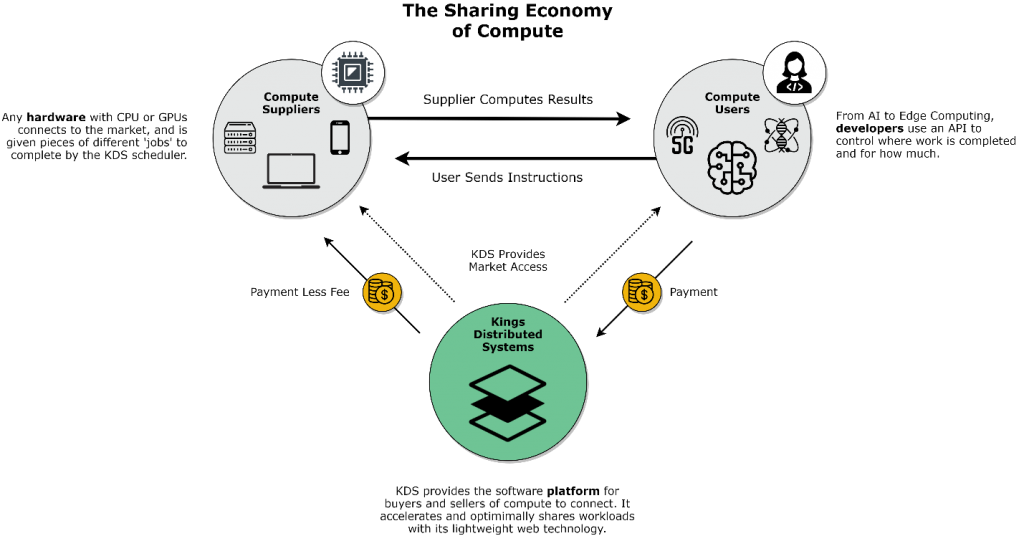More Innovation:
Distributive: Canadian Technology Unlocks the World’s Hidden Computational Resources
Published: June 9, 2020
A LACK OF COMPUTATIONAL RESOURCES IN CANADA
A severe shortage of affordable computing resources is putting Canadian research, innovation, and economic growth at risk.
Computing has never been more important for both business and science. Everything in the modern world increasingly relies on vast amounts of computational power, with AI alone doubling its consumption every 3.5 months.
Cloud computing is meant to address this. It has become a massive industry that was US$229 billion in 2019, but most supply is expensive and difficult to access. Worse, most Canadian customers must send their money and data outside of the country to large foreign corporations. Therefore, many of the country’s best innovators and small corporations cannot compete on the world stage.
Academic researchers in Canada suffer even more. They were only able to obtain 40% of the requested computing resources in 2019, and this number is expected to decline further (Compute Canada, 2019). Without urgent assistance, many brilliant ideas from drug discovery to AI will go unrealized. Less cutting-edge research means fewer high paying jobs and lost potential.
Meanwhile, there are vast amounts of computing resources sitting idle that could make all the difference.
Around the clock, computers, servers, and other devices everywhere wait dormant. Individuals, small companies, and large institutions alike acquire computers for specific projects. In between projects, those computers sit unused until needed again. Even the busiest data centers have idle computing capacity when not running at their peak, or simply because dedicated resources go unused. There is a sea of hidden computing power all around, but until now there was no efficient way to harness it all.
INTRODUCING THE DISTRIBUTED COMPUTER
The Distributed Computer taps into this vast wealth of underutilized computing power and provides deceptively simple APIs masking tons of complexity from overloaded CTOs, corporate developers, and even the average user. With a bit of an artistic license, the Distributed Computer is a hybrid cloud platform that can run computations on devices ranging from toasters to supercomputers. The platform provides an accounting system that meters computing resources in a two-sided marketplace that brings together both suppliers and users. Now, Canadian science and industry can access a world of otherwise idle, wasted compute power for pennies on the dollar.
The Distributed Computer provides a set of powerful APIs that can be used by developers of any skill level to run supercomputer-scale applications. These APIs simply connect the developer with the hardware in a three-party network like below.

The marketplace mechanism of the Distributed Computer is revolutionary for several reasons. First, it makes the economics of computing more efficient. Compute costs less, simply because of greater supply and more transparent pricing. The platform is also easy to use, using ubiquitous web technology that is faster and lighter than current cloud competitors. Finally, it creates a platform ecosystem that entirely new business models and apps can build on.
In addition to creating a public marketplace for computing resources, the Distributed Computer also allows enterprises to create private on-premises computing networks at zero additional infrastructure costs. Any organization can harness their fleets of underutilized computers and devices to bring a portion – if not all – of their commercial cloud workloads back in-house, vastly reducing their spending on a commercial cloud. Furthermore, their data never leaves the building.
In sum, the Distributed Computer will open huge new possibilities for everyone from executives to citizen-scientists. The Distributed Computer is up to 20x more cost-effective than public cloud computing and makes special features like edge computing for the IoT and renewable-energy datacentres easy to access.
DISTRIBUTIVE
Distributive is a 20-person technology company responsible for creating the Distributed Computer. Their team of seasoned web technology experts from Kingston, Ontario have undertaken the difficult task of building and readying the Distributed Computer for worldwide use. This requires combining open source and in-house technology in ways that have never been done before.
Distributive is addressing an outcry across Canada and the world from innovators deploring the high cost of computing resources. The company is undergoing rapid growth and is expanding partnerships worldwide.
SPEEDING UP THE DISTRIBUTED COMPUTER’S ENTRY TO MARKET IN CENGN’S TESTBED
In readying this innovative solution, Distributive partnered with CENGN (Centre of Excellence in Next Generation Networks) to ensure that the system was ready to meet the needs and specifications of the contemporary computing world. In a first-of-its-kind project spanning three of CENGN’s large datacentres, Distributive collaborated with CENGN to benchmark, tune, and scale-test the Distributed Computer. Using CENGN’s commercial-grade testbed, as well as its measuring and observing tools, Distributive was able to push the limits of the Distributer Computer. This project directly resulted in numerous improvements and enhancements to the product itself.
The successful conclusion of this project demonstrates that the Distributed Computer can operate on a commercial-sized and distributed platform. Furthermore, the tests confirmed the Distributed Computer’s advantages of ease-of-use, cost-savings, and efficiency. The Distributed Computer is now being rollout out for commercialization.
A great deal of exploration is conducted using powerful computers. Distributive is building the world’s most powerful computing platform – not only powerful in terms of hardware but powerful in the ability to democratize innovation and exploration.

Distributive is a growing Canadian business that is using the services at CENGN through the Next Generation Network Program (NGNP). The NGNP is a Government of Ontario program offered through a partnership between CENGN and the Ontario Centre of Innovation (OCI) that is providing small and medium-sized enterprises (SMEs) across Ontario access to the CENGN Testbed. CENGN’s digital infrastructure is connecting SMEs like Distributive to state-of-the-art equipment and network services, which will allow these companies to test and validate their solutions.
Are you interested in completing a CENGN project? Submit your project here.
Distributive has completed their CENGN project! Click the button below to learn more about their results









